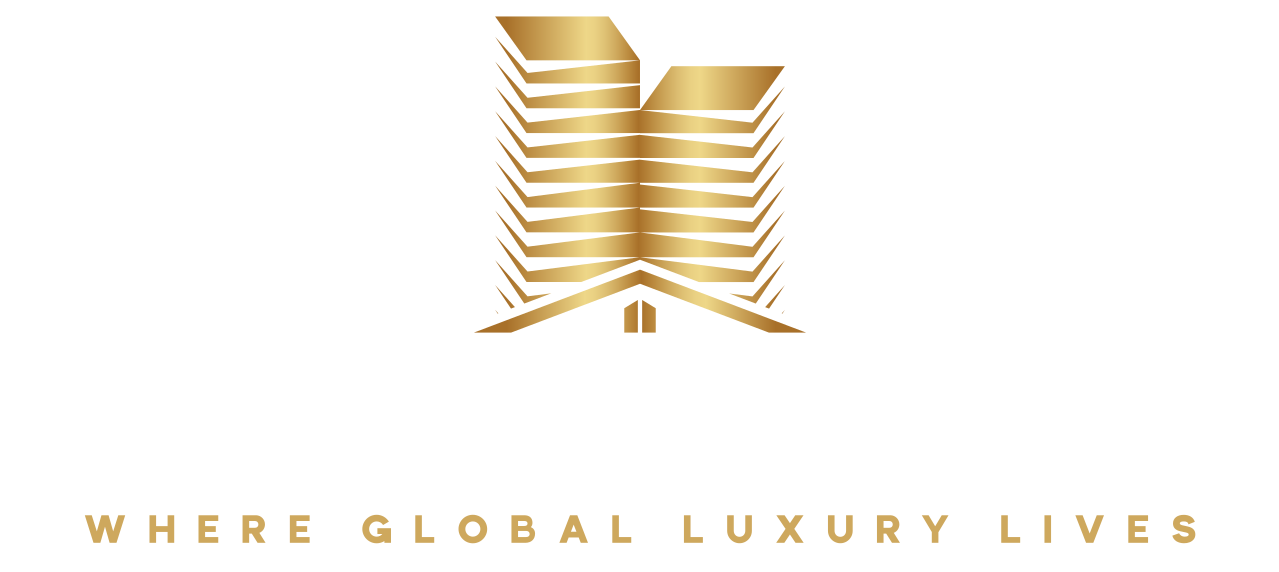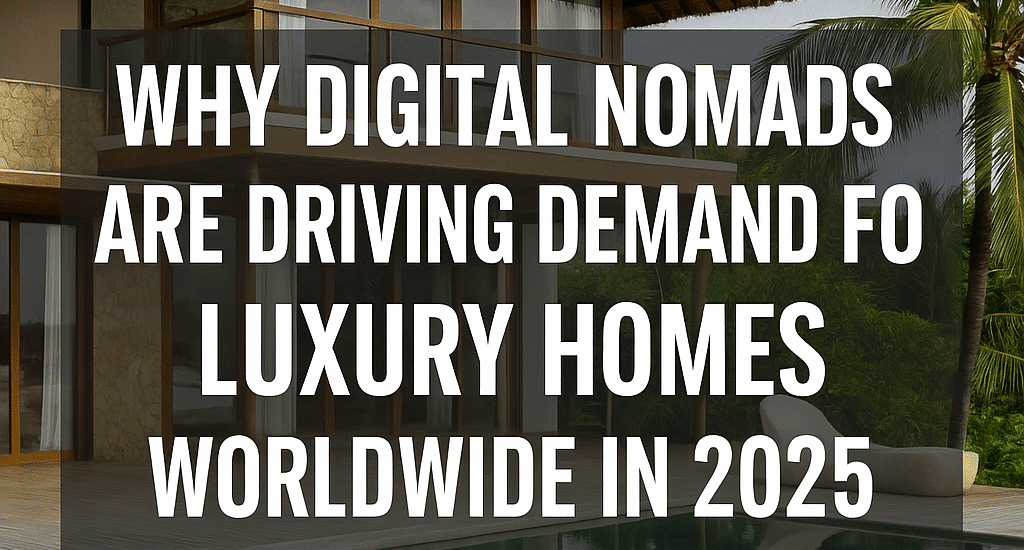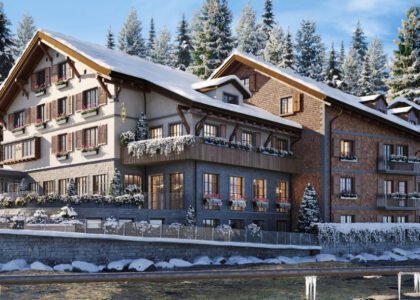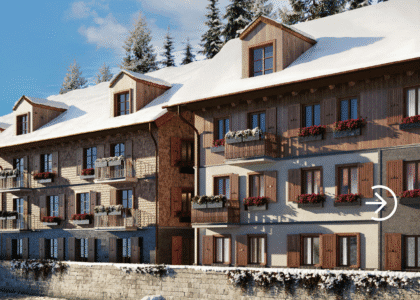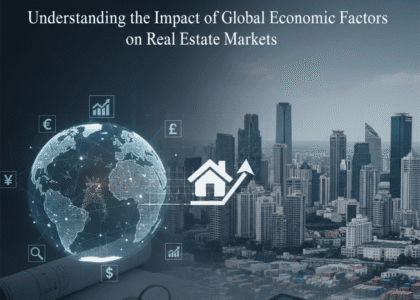The luxury real estate market is undergoing a transformation, and digital nomads are at the heart of it. As we step into 2025, a new wave of wealthy, remote-working professionals is reshaping the way the world views homeownership—especially when it comes to premium living. Digital nomads are no longer backpackers hopping from hostel to hostel. They are tech entrepreneurs, startup founders, executive consultants, and content creators with seven-figure incomes and a taste for luxury. Their demand for comfort, exclusivity, and global mobility has sent shockwaves through the upscale property market.
From the serene villas of Bali to the sleek penthouses of Lisbon, the demand for high-end homes is surging, and the reason is clear: the lines between work, lifestyle, and travel have permanently blurred. Today’s elite digital nomads don’t just want a home—they want an experience, a community, and a brand-new standard of luxury.
The Rise of the Digital Nomad Lifestyle
What Is a Digital Nomad in 2025?
In 2025, the definition of a digital nomad has expanded. No longer limited to freelancers or budget travelers, the term now includes high-earning professionals with the freedom to work from anywhere. These modern nomads often run remote teams, manage multimillion-dollar businesses, or serve as C-suite executives for global firms. With stable, substantial incomes and access to top-tier technology, they are driving demand for properties that match their elevated expectations.
These new-age nomads want seamless internet, stylish interiors, scenic views, and wellness amenities at their fingertips. Luxury isn’t just a want—it’s a requirement. They spend their days hopping between continents, conducting Zoom meetings from infinity pools, and living a lifestyle that merges productivity with pleasure.
Evolution of Remote Work and Its Impact on Housing Preferences
Remote work isn’t a trend anymore—it’s the new global infrastructure. In 2025, even Fortune 500 companies have embraced the remote model, empowering employees to choose their locations. This seismic shift means people aren’t tethered to traditional cities. Instead, they prioritize weather, cost of living, community, and aesthetics when choosing where to live.
Naturally, this flexibility has fueled the demand for upscale homes in dream locations. Buyers are looking for properties with co-working spaces, ocean views, smart home integration, and proximity to international airports. Developers and realtors are responding with luxury villas, penthouses, and gated communities designed with the mobile elite in mind.
Remote Work as a Catalyst for Global Relocation
Work-from-Anywhere: A New Normal
The work-from-anywhere movement has been one of the most powerful drivers behind luxury real estate’s global expansion. In 2025, it’s not uncommon for a startup founder to spend Q1 in Costa Rica, Q2 in Greece, Q3 in Tokyo, and Q4 in South Africa—all while running a thriving company from their laptop.
This trend has made it necessary for high-end properties to cater to location-independent professionals. That means better office setups, 24/7 concierge services, high-speed internet, and a living environment that’s as conducive to work as it is to relaxation.
The Rise of International Mobility Among Professionals
Professional mobility has evolved beyond occasional business travel. Many executives now maintain residences in two or three countries, splitting their time based on climate, tax benefits, or personal preference. Luxury homes serve not just as places to live but as strategic assets.
Remote executives and entrepreneurs often choose destinations with attractive visa programs (like Portugal’s D7 or Bali’s Second Home Visa), and invest in homes that offer ROI through rental income when not in use. This mobility fuels continuous demand across continents—boosting sales in Europe, Asia, Latin America, and the Middle East simultaneously.
Why Digital Nomads Are Choosing Luxury Real Estate
Shift in Buyer Mindset: From Budget to Lifestyle
There’s been a radical shift in what digital nomads are looking for in 2025. It’s not just about affordability or novelty anymore—it’s about lifestyle, exclusivity, and comfort. High-earning remote professionals view luxury real estate as a reflection of their success and values.
They want homes that inspire creativity, promote wellness, and offer sanctuary. They are drawn to spaces that are tastefully furnished, offer outdoor living, and support a minimalist but refined aesthetic. Think rooftop gardens, yoga decks, plunge pools, and in-home gyms—all integrated into serene environments where productivity can thrive.
Amenities That Attract the Affluent Remote Worker
Today’s luxury homes are smart, sustainable, and serene. Here are the top amenities attracting digital nomads in 2025:
- Smart Home Automation – Voice-controlled lighting, climate control, and security.
- Fiber-Optic Internet – Gigabit speeds for seamless video calls and uploads.
- Dedicated Workspaces – Private offices or co-working pods built into the design.
- Health & Wellness – In-house spas, cold plunge pools, saunas, and meditation rooms.
- Outdoor Living – Balconies with ocean views, private gardens, and rooftop lounges.
- Security & Privacy – Gated access, concierge services, and minimal public exposure.
This growing appetite for luxury living with remote work integration is making developers rethink how properties are designed—and how they’re marketed.
Hottest Destinations for Luxury Digital Nomads in 2025
Bali, Indonesia – The Tropical Tech Haven
Bali is more than a vacation spot—it’s a luxury nomad’s dream. With its vibrant spiritual culture, low cost of living, and stunning beachfront villas, Bali continues to dominate the digital nomad map. In 2025, areas like Canggu, Uluwatu, and Ubud have transformed into upscale hubs filled with coworking spaces, high-end cafes, and multi-million-dollar villas.
Developers have been quick to respond, building modern Balinese-style villas with infinity pools, rainforest views, and seamless indoor-outdoor living. The Indonesian government’s new Second Home Visa allows long-term stays, making Bali a magnet for remote millionaires looking to mix tranquility with innovation.
Lisbon, Portugal – The European Capital of Creativity
Lisbon combines old-world charm with modern innovation, making it a top choice for remote executives and digital creatives. Its D7 visa program makes long-term residency a breeze, while tax incentives for foreign investors sweeten the deal. Neighborhoods like Alfama, Principe Real, and Cascais offer stylish apartments and historic villas with breathtaking views.
Luxury real estate in Lisbon emphasizes classic architecture fused with high-tech amenities. Think marble floors, rooftop terraces, and panoramic river views—all wrapped in a cultural hub that celebrates music, food, and design.
Dubai, UAE – Tax-Free Luxury and Innovation
Dubai is no longer just a business hub—it’s a luxury living utopia for digital nomads in 2025. With zero income tax, futuristic infrastructure, and unmatched real estate options, Dubai has become a top pick for high-net-worth remote professionals. The city offers an eclectic mix of ultramodern skyscrapers, palm-shaped islands, and beachside villas that cater to the affluent nomad.
Areas like Downtown Dubai, Dubai Marina, and Palm Jumeirah are brimming with luxury apartments, sky villas, and waterfront mansions. The city’s digital nomad visa program and focus on innovation—like drone deliveries, AI-powered services, and smart city tech—make Dubai the perfect blend of productivity and pleasure. It’s no wonder elite digital nomads are scooping up properties here, not just for residence, but as premium investment assets.
Tulum, Mexico – Boho-Chic Meets Premium Living
Tulum has evolved from a laid-back beach town to a global hotspot for luxury nomads who crave eco-conscious, boho-chic lifestyles with upscale amenities. With jungle-side villas, oceanfront eco-resorts, and designer condos, Tulum offers a unique combination of sustainability and exclusivity.
Tulum’s luxury homes come equipped with rooftop infinity pools, outdoor yoga decks, and artisan interiors inspired by local culture. Its digital nomad visa allows remote workers to stay legally while enjoying top-tier wellness services, international coworking hubs, and a vibrant community of entrepreneurs. Whether it’s beachfront serenity or jungle hideaways, Tulum serves up premium lifestyle options that perfectly align with the desires of today’s remote elite.
Digital Nomads and the Boom in High-End Property Listings
Surge in Demand for Exclusive Homes Worldwide
In 2025, real estate brokers and developers are witnessing a dramatic rise in inquiries for high-end property listings from digital nomads. This clientele isn’t looking for average homes—they’re searching for exclusive estates, designer villas, and turnkey properties with all the bells and whistles. The global appetite for “remote work luxury” is causing inventory shortages in popular destinations, and bidding wars are becoming common in places like Mallorca, Costa Rica, and Cape Town.
The keyword “exclusive homes worldwide” is more than just SEO—it’s the actual demand. Remote workers now buy properties as lifestyle decisions, often maintaining multiple homes across continents to align with seasons, events, and business goals.
How Developers and Agents Are Responding
To cater to this affluent and mobile demographic, developers are building luxury properties with flexible ownership models, such as fractional ownership or branded residences with managed services. Real estate agents have adapted by becoming more than just sellers—they are now lifestyle consultants, relocation specialists, and global advisors.
Agencies now offer curated luxury listings tailored to remote professionals’ needs, complete with 3D virtual tours, relocation packages, and multilingual staff. Some have even started offering NFT-based property ownership and cryptocurrency payment options to attract tech-savvy nomads who expect seamless digital transactions.
The Financial Power of Remote Entrepreneurs and Executives
Tech Founders, Influencers, and the High-Earning Remote Elite
The modern digital nomad isn’t just a freelancer with a laptop. In 2025, many are millionaires—startup founders, SaaS developers, fintech investors, and influential YouTubers or Instagram personalities. These individuals command powerful online audiences, manage profitable businesses, and make strategic decisions about their living environments.
What sets this group apart is their financial capability. They can afford to drop $2 million on a luxury villa in Costa Rica or rent a penthouse in Tokyo for $15,000 a month. They see their homes as extensions of their brands, creative spaces, and safe havens. Their financial might has redefined what the term “nomad” represents.
Why Luxury Property Investments Appeal to Digital Professionals
For these affluent nomads, investing in luxury properties isn’t just about lifestyle—it’s also a smart financial move. Real estate offers stability, capital appreciation, and rental income potential. Many digital professionals see owning high-end homes in international hotspots as part of a diverse investment portfolio.
What’s more, luxury real estate often acts as a hedge against inflation and currency fluctuations. Whether it’s beachfront property in Portugal or a desert oasis in the UAE, these homes provide tangible value while doubling as a status symbol. And with global real estate markets becoming more transparent and accessible, remote investors can explore, evaluate, and close deals from anywhere in the world.
The Role of Technology in Facilitating Global Luxury Property Sales
Virtual Tours, AI Agents, and Blockchain Transactions
The luxury real estate sector in 2025 is tech-driven, just like its buyers. Remote buyers expect immersive 3D virtual tours, drone footage, and AI-driven matchmaking platforms that recommend properties based on lifestyle preferences. No longer limited to in-person visits, luxury home shopping now begins (and often ends) online.
Smart contracts and blockchain are being used to streamline the buying process—offering transparency, security, and speed. Many elite buyers now close deals with cryptocurrency, skipping traditional financing and accelerating international property acquisition.
How Remote Buyers Navigate International Luxury Real Estate
Global digital nomads don’t have time for paperwork and bureaucracy. They rely on expert brokers, relocation lawyers, and international mortgage advisors to help them buy across borders. Many also work with concierge real estate firms that handle everything from property scouting to home furnishing and visa arrangements.
With time zones and distance no longer barriers, luxury home buying is becoming a seamless, tech-supported experience. Agents now offer 24/7 communication via messaging apps, AI assistants to track buyer preferences, and multilingual support to cater to clients across the globe.
Premium Real Estate Services Tailored for the Digital Nomad
Luxury Property Consultants and Global Relocation Advisors
In 2025, digital nomads aren’t just looking for homes—they’re seeking curated lifestyles. That’s where luxury property consultants and global relocation advisors come in. These professionals offer end-to-end services for high-net-worth nomads who demand convenience, speed, and personalization in their property search.
From sourcing off-market listings in international hotspots to navigating local tax laws and immigration regulations, these consultants act as one-stop solutions. They also assist with securing golden visas, handling legal documentation, and ensuring that the buyer experience is smooth and stress-free.
For instance, a tech founder moving to Portugal might receive a tailored property portfolio, accompanied by financial planning strategies, legal aid, and even introductions to private schools or luxury gyms. This holistic, concierge-level approach is exactly what upscale nomads expect—and are willing to pay top dollar for.
Concierge Living: Curated Services for the Mobile Elite
Luxury homes today don’t just offer bricks and mortar—they offer services. Concierge living is redefining what it means to own a property in 2025. High-end buyers can now access a suite of services, including:
- 24/7 virtual concierge for personal errands, travel bookings, and event planning
- On-demand housekeeping, chef, and wellness staff
- Airport transfers and chauffeured vehicles
- Private security and personal assistants
- Property management while abroad
Whether they’re living in Bali for two months or hopping to Dubai for a business summit, digital nomads expect their homes to be maintained and ready for their return. Concierge services are the new standard for luxury—transforming residences into seamless, hotel-like experiences that evolve with the owner’s lifestyle.
The Economic Impact on Local Luxury Real Estate Markets
Rising Property Prices in Nomad Hotspots
The influx of digital nomads with serious buying power is having a ripple effect on real estate markets worldwide. In hotspots like Lisbon, Tulum, and Bali, property values are climbing fast, especially in premium neighborhoods. Demand is so intense that luxury properties are sometimes sold before hitting the open market.
While local economies benefit from the injection of wealth, it also introduces challenges—such as increased living costs and limited inventory for local residents. Developers are scrambling to meet demand, but zoning laws and environmental restrictions can create supply bottlenecks.
Nevertheless, for investors and high-income buyers, these markets offer tremendous upside. A luxury apartment bought today in Lisbon or a villa in Tulum could appreciate significantly within just a few years, making it both a lifestyle choice and a lucrative financial asset.
Shifts in Local Development and Infrastructure Demand
With rising luxury demand comes a need for better infrastructure. Governments and municipalities in nomad-friendly destinations are now investing in:
- Upgraded airports and flight connectivity
- Fiber-optic internet networks
- Luxury coworking and coliving developments
- Green and sustainable building standards
- Healthcare and wellness infrastructure
Tulum, for example, has fast-tracked new roads and eco-resorts to support its growing expat population. Meanwhile, Lisbon is expanding its startup ecosystem with incentives for foreign professionals. As luxury demand grows, cities are transforming to accommodate not just tourists—but long-term, high-income residents who live, work, and spend locally.
Challenges and Concerns in the Upscale Property Market
Regulatory Hurdles and Foreign Ownership Restrictions
Despite the boom, buying luxury property internationally isn’t always simple. Digital nomads often face hurdles like foreign ownership laws, visa complexities, and local taxes. Countries like Thailand and Indonesia, for example, have restrictions on foreigners owning land outright, pushing buyers toward leasehold or company ownership models.
Understanding these nuances is critical. Missteps can lead to legal headaches or even loss of investment. That’s why working with experienced luxury property advisors is non-negotiable for digital nomads entering unfamiliar markets.
Furthermore, tax residency issues and double taxation treaties must be considered. High-income nomads who split time between countries need expert advice to remain compliant while maximizing their wealth.
Cultural Sensitivity and Responsible Luxury Living
Digital nomads must also navigate cultural integration responsibly. Moving into a community with high-end tastes and global expectations can sometimes clash with local traditions and economies. Rising property prices can cause friction between expat buyers and local populations.
As such, many buyers now look for ways to give back—supporting local artisans, employing domestic staff, or investing in sustainable building practices. Ethical luxury is becoming more than a buzzword; it’s an expectation among the new generation of globally minded professionals.
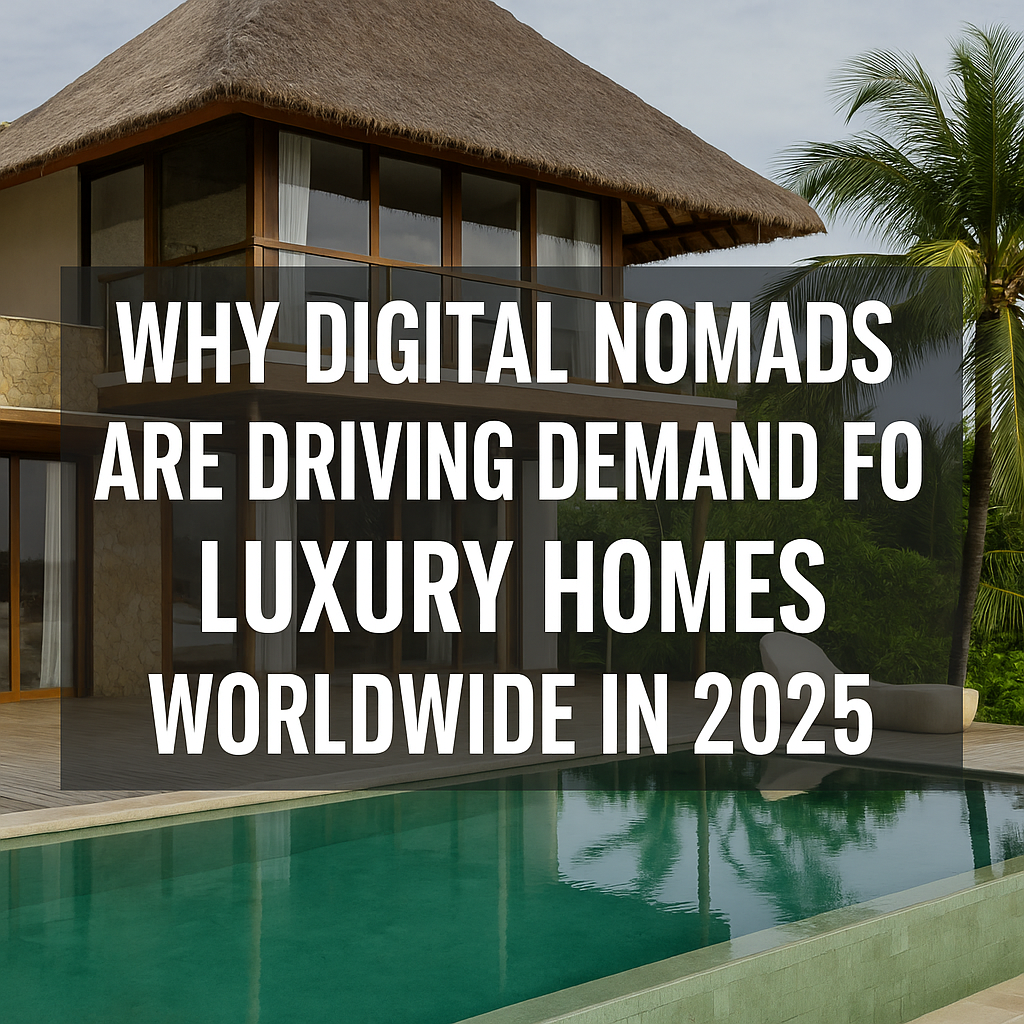
Forecast for Luxury Real Estate in 2025 and Beyond
Trends That Will Shape the Next Five Years
Looking ahead, the luxury property market will continue to evolve, influenced heavily by the behaviors and preferences of digital nomads. Key trends include:
- Smart luxury homes powered by AI and sustainable tech
- Flexible ownership models such as fractional or co-ownership for global mobility
- Wellness-integrated properties with in-home spas, gyms, and nature connectivity
- Eco-luxury developments focusing on carbon neutrality and off-grid living
- Digital-first buying experiences with VR tours, remote closings, and blockchain contracts
As remote work becomes more normalized, and borders become easier to cross through digital visas and expat-friendly policies, the demand for luxury homes in previously untapped regions will explode.
Opportunities for Investors, Brokers, and Developers
For real estate professionals, now is the time to pivot. Agents who specialize in global relocations and luxury nomad niches will thrive. Developers who innovate with flexible designs, sustainable materials, and built-in remote work amenities will lead the market.
Investors can also benefit from the rise of digital nomads by acquiring property in emerging luxury hotspots—areas where prices are still accessible but poised for massive appreciation as demand increases.
How Primo House Can Help You Find Your Ideal Luxury Home
Exclusive Listings for Global Digital Nomads
At Primo House, we specialize in matching elite digital nomads with properties that fit their lifestyle, values, and professional needs. Whether you’re looking for a minimalist villa in Bali, a modern penthouse in Dubai, or a historic estate in Lisbon, our global database of luxury homes for sale and exclusive homes worldwide ensures you’ll find your dream location.
We don’t just offer listings—we curate experiences. From the first virtual tour to the final key handover, our team provides hands-on, white-glove service designed for the discerning remote professional.
Personalized Matchmaking with Elite Property Experts
Our luxury property experts and global real estate advisors work directly with you to understand your goals, budget, and lifestyle. We combine market insights with personal attention to find properties that aren’t just investments—they’re statements.
Let Primo House be your trusted partner in the search for premium real estate, anywhere in the world.
Conclusion: The New Era of Work Meets Luxury Living
Digital nomads have forever changed the face of luxury real estate. What started as a fringe movement has become a mainstream lifestyle, driven by freedom, wealth, and global mobility. In 2025, high-end properties are no longer about location alone—they’re about creating a lifestyle that blends work, wellness, and wonder.
Luxury developers, real estate brokers, and service providers must now adapt to this new breed of buyer—tech-savvy, values-driven, and perpetually in motion. For those ready to meet these expectations, the rewards are vast. The world isn’t just your office anymore—it’s your home.
FAQs
Q1: What makes digital nomads invest in luxury properties?
A1: Affluent digital nomads seek lifestyle, comfort, privacy, and investment returns. Luxury homes offer workspace convenience, high-end amenities, and serve as valuable assets in global portfolios.
Q2: Which destinations are trending for remote luxury living in 2025?
A2: Bali, Lisbon, Dubai, and Tulum are among the hottest spots due to visa programs, tax benefits, stunning environments, and thriving expat communities.
Q3: Can digital nomads buy property as foreigners?
A3: Yes, though it depends on the country. Some require special ownership structures, while others, like Portugal and Mexico, are very open to foreign buyers.
Q4: What services should I expect from a luxury real estate broker?
A4: Expect personalized listings, virtual tours, global market insights, legal support, concierge assistance, and post-sale services like property management and relocation help.
Q5: Is luxury real estate a smart investment for remote professionals?
A5: Absolutely. Luxury real estate offers long-term appreciation, rental income opportunities, and lifestyle benefits—all aligned with the needs of high-income nomads.
